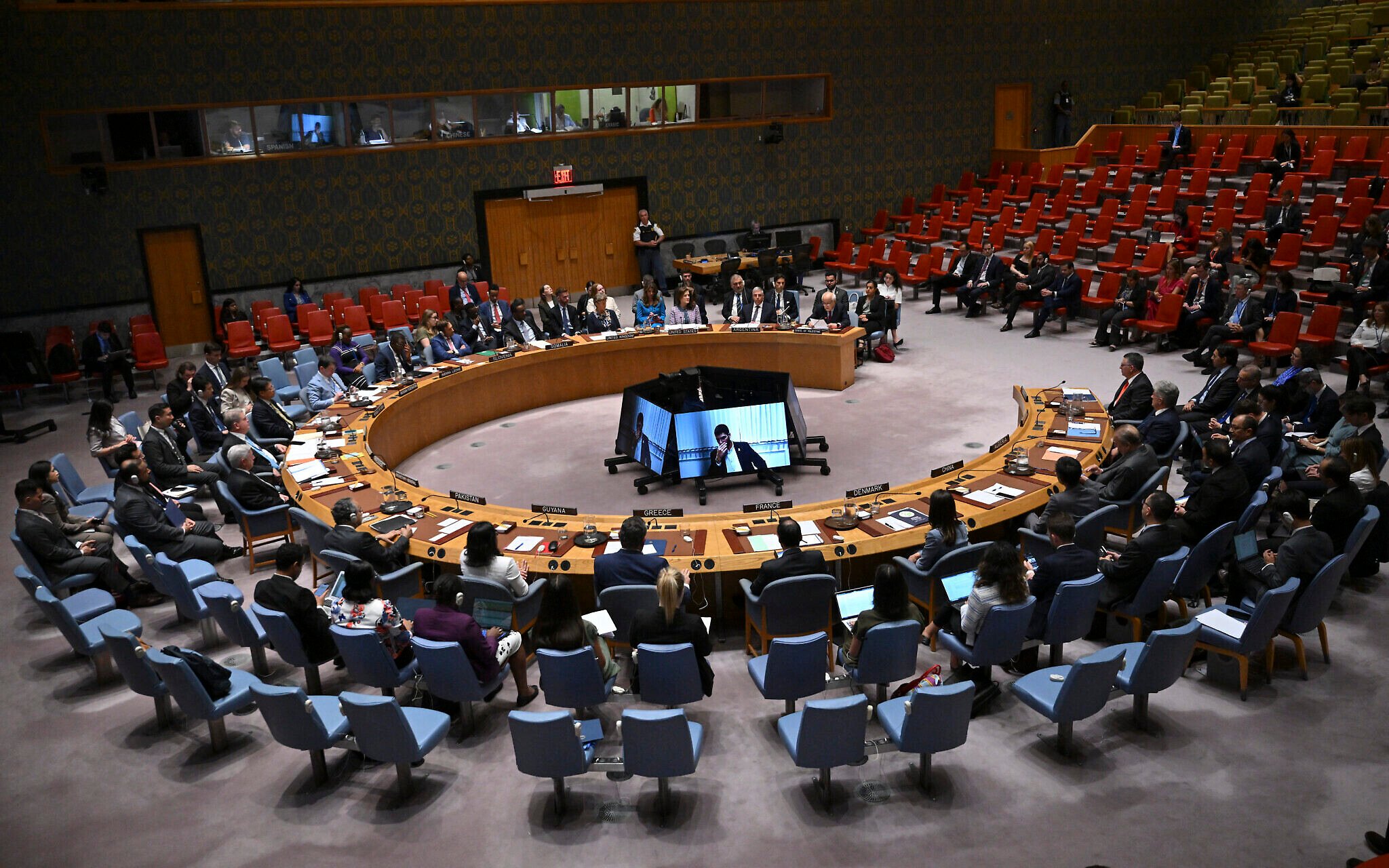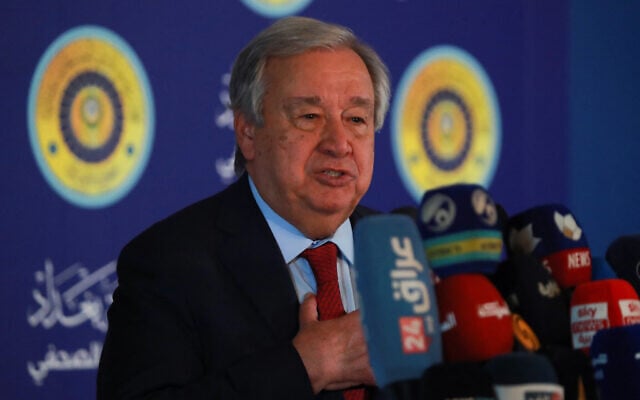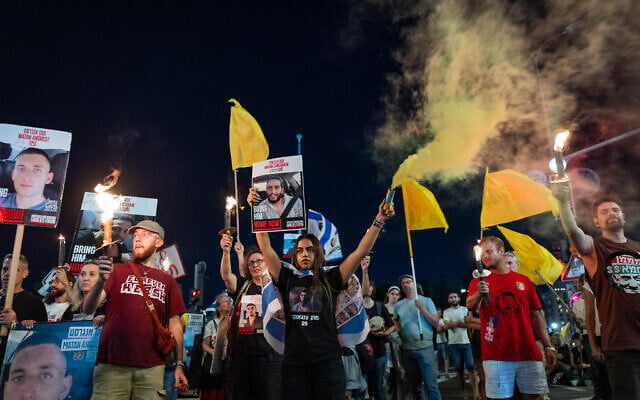



The United Nations Security Council will meet in a rare weekend session on Saturday to discuss Israel’s decision to take control of Gaza City, three diplomatic sources told AFP.
The meeting at 1900 GMT had been requested by several members of the Security Council, a member of the Council told AFP, as global concern mounts over Israel’s plan.
Riyad Mansour, the Palestinian Authority’s UN envoy, also said earlier in the day that a number of countries would be requesting a meeting at the Security Council to discuss Israel’s plans, which were approved in an overnight cabinet session.
The Security Council session is unlikely to produce any resolution or even statement, despite the widespread international opposition to the Israeli plan, as the US would be certain to block such initiatives.
The Gaza City takeover, which was authorized despite the military’s opposition, has sparked fierce criticism at home and abroad, with hostage families saying it will endanger their loved ones and foreign governments warning of dire consequences for Gaza’s civilians.
UN chief Antonio Guterres said Friday that the Israeli plan was a “dangerous escalation” that risked worsening conditions for ordinary Palestinians, his spokesperson said.
“The Secretary-General is gravely alarmed by the decision of the Israeli Government to ‘take control of Gaza City’. This decision marks a dangerous escalation and risks deepening the already catastrophic consequences for millions of Palestinians,” Guterres’s spokesperson said in a statement.
The statement came as the UN and other aid agencies have reported skyrocketing cases of malnutrition in Gaza. Israel has blamed the crisis on the UN and Hamas, both of whom it accuses of impeding aid deliveries.
The plan’s limitation of the IDF takeover to Gaza City did not seem to go as far as what had earlier been characterized as a plan to occupy the entirety of the Strip. Netanyahu told Fox News hours before the security cabinet convened that a full takeover was his intention.
However, a statement from Netanyahu’s office notably described the adopted proposal as one aimed at “defeating Hamas,” meaning that there may be subsequent operations beyond the one for Gaza City that were approved and not announced.
The decision did not use the word “occupy,” and instead referred to “taking over,” due to legal reasons pertaining to Israel’s responsibility for civilian matters in Gaza, according to the Ynet news site. The outlet added, however, citing an unnamed senior Israeli official, that this distinction was superficial, and the decision in fact relates to full military rule. The conquest would stop if a hostage deal is clinched, according to the report.
Roughly one million Palestinians — many of whom have already been displaced several times throughout the 22-month war — currently reside in Gaza City, in northern Gaza. A senior Israeli official told The Times of Israel news that the plan approved by the cabinet will see those civilians evacuated toward the south.
The cabinet decision states that Palestinians will have until October 7, 2025, to evacuate Gaza City — a two-month window that also coincides with the second anniversary of Hamas’s attack on Israel, the Israeli official said. The IDF will then launch its ground offensive into Gaza City, placing a siege on the area in order to kill any remaining Hamas operatives. After the takeover is complete, the official indicated that the IDF will proceed to the remaining unconquered areas of Gaza.
Israel says it currently controls 75 percent of the Strip, while the IDF has largely avoided entering the remaining 25% — which mostly comprises Gaza City and refugee camps in central Gaza — due to the belief that most of the hostages are being held there. Almost all of Gaza’s 2 million citizens are currently in the quarter of the Strip that the IDF does not control. Hamas has threatened to execute hostages if its operatives detect Israeli troops closing in; Hamas captors killed six Israeli hostages in Rafah, in southern Gaza, last August, when IDF troops inadvertently neared the tunnel where they were being held.
Hostage families, who demand the government end the war and reach a comprehensive hostage deal, staged fiery protests in Tel Aviv and Jerusalem Thursday night as the cabinet convened to discuss the Gaza plans.
They argue that the last five months have proven that military pressure has not led Hamas to release the hostages and that Israel is in a position to agree to Hamas’s demand to end the war, as the terror group no longer poses a strategic threat to Israel.
Hamas has fully transitioned to fighting as a guerrilla group, causing roughly three dozen Israeli casualties since Israel broke the ceasefire in March by launching Operation Gideon’s Chariots, which was also aimed at securing the release of the hostages and defeating Hamas.
Netanyahu argues that ending the war and withdrawing from Gaza, as Hamas demands, will allow Hamas to regroup.
In the meantime, Netanyahu has rejected any post-war governing role in Gaza for the Ramallah-based Palestinian Authority, and otherwise refused to advance a viable governing alternative to Hamas.
The premier’s critics say this has allowed the war to drag out endlessly as Hamas has managed to remain the most dominant Palestinian force in Gaza. For his part, Netanyahu has argued that no alternative to Hamas will be able to survive in Gaza before the terror group has been defeated.
Netanyahu’s government also relies on far-right coalition partners who oppose a hostage deal and want to permanently occupy the Strip, push out its residents and re-establish settlements in their place.


